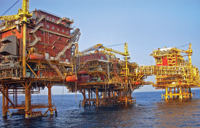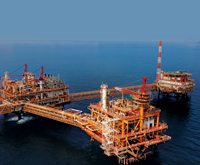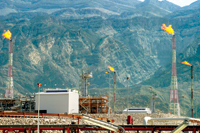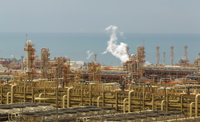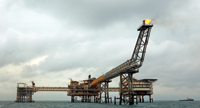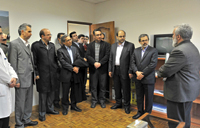
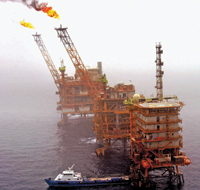 Iran has 33.6 trillion cubic metres of gas reserves
Iran has 33.6 trillion cubic metres of gas reserves
OIL major BP cut its global natural gas reserves estimate for the first time in decades, revising Russia’s still classified holdings down sharply and putting Iran at the top of the world league table.
In its Statistical Review of World Energy, BP put global proven gas reserves at 187.3 trillion cubic metres as of the end of 2012, enough for about 56 years of global production at current rates.
BP’s annual review of energy statistics, first published in 1951, is considered an industry benchmark. Last year’s report put gas reserves at 208.4 trillion cubic metres. The cut of 21 trillion equals roughly seven years of global gas use.
Russia, the world’s biggest gas reserves holder for many years, was responsible for the bulk of the reduction, with its reserves estimate downgraded to 32.9 trillion from 44.6 trillion in last year’s report.
BP’s chief economist Christof Ruhl says the company decided this year to adjust its estimates for the former Soviet Union, including Russia, where data on reserves is classified.
“Traditionally countries of the former Soviet Union had different criteria than used elsewhere. So we used a conversion factor to convert that from those countries where we don’t get direct data,” Ruhl says.
“In some countries, reserves are still a state secret, so we have to rely on these data,” he adds.
BP also cut its estimate of gas reserves in the US, where the energy industry has been transformed by shale oil and gas, due to lower prices and reduced drilling. US reserves ended 2012 at 8.5 trillion cubic metres, down 0.3 trillion from 2011.
The downgrade left Iran at the top of the table of the world’s largest gas reserves holders for the first time in decades, with its broadly unchanged reserves of 33.6 trillion.
Russia remains a much larger gas producer than Iran, which is unable to exploit the full potential of its resources, because US and European trade sanctions over its nuclear program have stalled energy projects.
BP has had a bumpy experience in Russia over the past decade. TNK-BP, its venture with Russian billionaires, generated billions of dollars in dividends for BP but also led to clashes with the Kremlin.
The company sold out of the venture this year to become a major shareholder in state-controlled champion Rosneft. The latter is pursuing an aggressive gas strategy to rival state-controlled Gazprom, Russia’s gas export monopoly and holder of most of its gas reserves.
In its review, BP also steeply downgraded Turkmenistan’s reserves to 17.5 trillion from 24.3 trillion and cut its reserves estimates for Kazakhstan, Uzbekistan and Azerbaijan.
On the oil side, BP estimated global proven oil reserves at 1,669 billion barrels at the end of 2012, up slightly from 1,654 billion at the end of 2011 and enough to maintain current global production levels for 53 years.
In its report a year earlier, BP had revised global oil reserves sharply higher, citing new technology that made heavy crude grades in Canada and Venezuela economically profitable to extract.
Its figure for US oil reserves rose to 35 billion barrels from 31 billion last year, more than 2 per cent of global reserves.
A report from the US government’s Energy Information Administration on Monday pointed to the dramatic impact of shale on world energy. Shale deposits will boost total world crude resources by 11 per cent, it says.
BP upgraded reserves for both Iran and Iraq by several billion barrels and kept them at their No3 and 4 global spots, respectively. Venezuela and Saudi Arabia kept their first and second places with no major revisions over the year.
Ecuador, Norway and China were included in upward reserves revisions, while estimates were downgraded for South Sudan, Malaysia, Angola and Gabon.



















































































